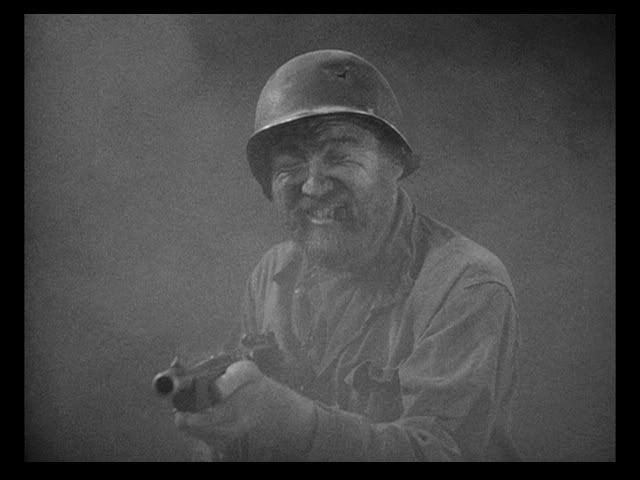The Steel Helmet (1951, Fuller): A blunt instrument, wielded with passion and integrity.

Yi Yi (2000, Yang): Sprawling familial drama, about as good as anything Robert Altman ever made. Yang's style is different from Altman's though, more consistently elegant, and never cynical. A tracking shot is an event here. Also profound, and very funny.
A Serious Man (2009, Coen): A laff riot, certainly, but even bleaker than No Country for Old Men. Maybe the Coens' humor here doesn't give us the same distance that Cormac McCarthy's apocalyptic austerity does there, or maybe it's the movie's unsettling rhythms that do it. Either way, dig that tornado.
Where the Wild Things Are (2009, Jonze): Sad rumpus, good rumpus. While it's true that this is a mopey adult's vision of "authentic" childhood, it's still an affecting and strange experience.
Russian Ark (2002, Sokurov): It's often overwhelming and sublime, but sporadically dull, too. The latter perhaps an inevitability given the nature of the stunt being attempted, the former cause for much celebration.
The President's Last Bang (2005, Im): Dense, bloody, and funny, but all three qualities seem slightly disjointed from one another, at least on first viewing. Context helps.
Paranormal Activity (2007, Peli): This is a pretty excellent creepout. Not much else is going on (don't really buy the domestic violence reading floating around the film blogosphere). Does there absolutely have to be? If we can't appreciate a well-executed scare, and this is a long series of them, we've lost touch with something primitive but essential. The animus some of the movie's detractors have directed at the leads is misplaced. They're probably the most credible protagonists in any of these horror faux-docs.
Pickup on South Street (1953, Fuller): There's profundity in Mo getting her head blown off. In the fights, too, and those proto-Pickpocket subway scenes.
Stray Dpg (1949, Kurosawa): Postwar J-noir, underrated or at least under-discussed in AK's oeuvre. More alive and lived-in than some of his later masterpieces. Flawed by a couple off scenes and the usual preachiness and sentimentality, yet there are many stunning sequences, like cop Toshiro Mifune's long, dissolve-heavy and plot-slowing wanderings through the Tokyo underworld, and the gorgeous climactic standoff in the swamp.
Martyrs (2008, Laugier): Half the nastiest (if not the goriest) horror movie of the aughts, half audacious subversion of the tenets of hardcore, torture-heavy cinema. One's mileage will vary based on whether you can reconcile these two halves (and of course if you can stomach it--most won't be able to). The director, who in his introduction to the movie and the fairly extensive and unvarnished documentary about its making seems genuinely uncomfortable with having made the thing, might be going places, more interesting and ambitious ones than fellow Gallic gorehound Alex Aja. Might write more if I can bring myself to, as there's a serious dearth of adequate critical writing about it.

Cat People (1942, Tourneur): I wasn't exactly spooked, but quite a lot of it is breathtaking and haunting in ways most horror isn't interested in being these days. Saw and liked Paul Schrader's remake years ago and I sorta want to return to it now.
Martin (1977, Romero): Jagged brilliance, on par with Dawn of the Dead, at least. Perhaps my favorite vampire movie. In his prime, George Romero's command of montage is dazzling, and here, at its most fractured and subjective, it maps out Martin's psyche so compellingly that even the more awkward, lo-fi moments are subsumed into the movie's frenzy.
Twin Peaks: Fire Walk With Me (1993, Lynch): I liked this still undervalued and powerful entry in the Lynch canon slightly less this time around, as I became more conscious of why it was panned so badly upon release. It's completely inaccessible to Peaks neophytes and the relentless darkness and obscurantism and beyond disjointed structure of it can put off some Peaks acolytes, too. By that same token, the parts I was never particularly crazy about, namely the whole opening chapter with Chris Isaak and Kiefer Sutherland, which is essentially a straightfaced parody of the show, are now hilarious to me. It's a strange world.
Zombieland (2009, Fleischer): Almost totally witless, if watchable. Unlike with Shaun of the Dead, the people behind it don't seem particularly passionate or knowledgeable about the genre, and they aren't clever, either. I wouldn't be surprised if Shaun's the only zombie movie they've seen. Calling this the American equivalent of Shaun is almost an insult to American comedy. Woody Harrelson's performance and Bill Murray's funny but over-celebrated cameo are the highlights. Okay, and the sight of Abigail Breslin blasting ghouls.
Bram Stoker's Dracula (1992, Coppola): If this were a silent film, it would be one of The Greats. Alas, there is sound, so we have Keanu and myriad stinker lines and misjudged scenes. Very enjoyable camp. Not coherent, but incoherent in an interesting way.
Friday Night (2002, Denis): A completely immersive one night stand in Paris. Playful subjectivity: ambiguous, unheralded fantasies, a smiling pizza and a dancing S. Denis knows how to shoot skin, this I knew, but here I learn she knows how to shoot traffic and pinball machines. In a three-way tie with 8 1/2 and Weekend for Greatest Celluloid Traffic Jam.
Onibaba (1964, Shindo): Sweaty, languid, racy, funny, and unsettling, with the most omnipresent reeds in the history of movies. That might sound like an insignificant distinction for a movie to hold, but it isn't after bearing witness to this. Viddied at The Auteurs.
